By Jennifer Kemp, MPsych, author of The ACT Workbook for Perfectionism
Do you set very high standards for yourself? If so, you might call yourself a perfectionist and have perfectionist habits. Being a perfectionist means being motivated to achieve excellence and aim for flawless results. Yet there’s a dark side to perfectionism, too. Perhaps you continue to raise your standards over time, leaving them always out of reach. Maybe you get stuck trying to avoid failure, working harder and harder trying to make things perfect, burning yourself out in the process. Sometimes, if you can’t achieve your standards, you might opt out of important things altogether. You probably criticize yourself for every little thing you do wrong. This can leave you feeling like a failure, even when you’ve achieved something amazing.
Perfectionism used to be thought of as part of your personality, and therefore something you are stuck with. However, we now think differently. If you look at these unhelpful perfectionist habits as patterns of behaviors that are learned over time, they become something that you might be able change. And, by focusing on only changing the unhelpful habits that are causing you problems, you get to keep the good parts of perfectionism—striving to achieve great outcomes—while also enjoying yourself along the way. Perfectionism can become a more useful part of your life.
At first it may not be easy to change your unhelpful perfectionist habits. They develop over time because they help you avoid failure and the self-criticism that comes with it. Unhelpful habits like procrastinating, working excessively hard, repeatedly checking your work, and avoiding feedback or social situations (or any activity where you can’t perform perfectly), might make you feel better in the short term, but in the long term they cause other problems. You get behind in your work, miss out on opportunities, and still feel anxious and stressed.
There is a way you can transform unhelpful habits into more helpful perfectionism. The following steps outline how you can unwind those unhelpful habits, and move from feeling stuck to striving for excellence in a healthy and flexible way.
1. Understand what you are trying to avoid
No one wants to fail. This is something that we all prefer to avoid. By failure, I mean any situation where you feel a sense of shame, such as:
• Other people judging you negatively
• Being incompetent
• Not being liked
• Not being good enough
• Losing your job or failing your degree
• Losing important relationships
• Destitution and financial ruin
Sometimes called the ‘Big Bad,’ this will be the common theme for your worries. The first step is identifying your Big Bad. Your unhelpful perfectionism is driven by this fear, so it’s time to shine a light on what worries you.
2. Pay attention to how you feel when you make a mistake
Whenever you make a mistake, you will be flooded by critical thoughts, powerful emotions, and uncomfortable and unwanted physical sensations such as tightness in your chest; a sinking, clenching, or dropping feeling in your stomach; or shakiness and agitation all over your body. Pay attention to when these experiences show up and how you respond. Your avoidant and unhelpful habits are designed to protect you from feeling this way. Notice also how these feelings rise and fall, and eventually pass, even if you can’t fix your problem. They don’t last forever, even if sometimes they may last for a while.
3. Notice how you respond to these feelings
What specific things do you do to avoid feeling this way? When you feel worried about making a mistake, do you procrastinate to avoid that happening? Are you spending too long on tasks, trying to make sure your boss will be happy with you? Do you avoid doing some things altogether because you can’t do them well? Doing this might help you feel better in the short term, but it is likely to cause you problems in the long run. Take note of the bigger problems these habits are causing you. What are you missing out on? If you could allow your uncomfortable feelings to rise and fall, perhaps you can learn to respond a different way?
4. Look to a better future
Take a moment here to daydream. What would life be like if you could strive toward excellence without getting stuck in these unhelpful perfectionist habits? How could your life be better? What would changing these habits allow for? Imagine yourself in this future. What would you be doing differently? How would you feel? Use this image to motivate you to make a change.
5. Choose one thing to change
Choosing just one small habit to focus on at a time is the best pathway to successful change. Perhaps you’d like to start your work a little earlier, rather than leaving it to the last minute. Perhaps you’d like to send your emails after reading them through just once rather than multiple times. Many perfectionists try to change everything at once or get stuck setting goals that require them to be perfect to succeed. Try not to set a goal that requires a different kind of perfection. Instead, pick one small thing and try to increase the frequency of the new behavior over time. This is hard enough, because it means taking a risk and doing something different even when you feel uncomfortable and scared of making a mistake.
6. Remember to be kind to yourself
It may feel necessary to be hard on yourself. You may worry that you will be lazy if you aren’t. Yet criticizing yourself when you are struggling only amplifies your struggle, making things worse. Try to be kinder to yourself when you are struggling. If you feel overwhelmed by anxious feelings, pause to take a few breaths. Soften your attitude toward yourself and treat yourself with the same kindness you would offer a small child who was struggling to do something new. Being mean and critical of yourself is ultimately demotivating and confidence-crushing. It might be hard to be kind to yourself and you may not know how, yet finding a way to do this is the final and most important step toward more helpful perfectionism.
Changing your unhelpful perfectionist habits takes time and repeated practice. Along the way you will inevitably get off track, so when this happens, take a moment to be kind to yourself. Remember that you cannot be ‘perfectly imperfect’—there’s only imperfect. Taking small, imperfect steps toward greater flexibility and self-compassion will help you to keep striving for success without getting stuck in such unhelpful habits.
Jennifer Kemp, MPsych, is a clinical psychologist in private practice in Adelaide, South Australia. She works with adults and adolescents using acceptance and commitment therapy (ACT) to treat issues such as perfectionism, anxiety, obsessive-compulsive disorder (OCD), eating disorders, and chronic illness.



 2024 Peace Playbook: 3 Tactics to Avoid Clashes with Your Partner
2024 Peace Playbook: 3 Tactics to Avoid Clashes with Your Partner